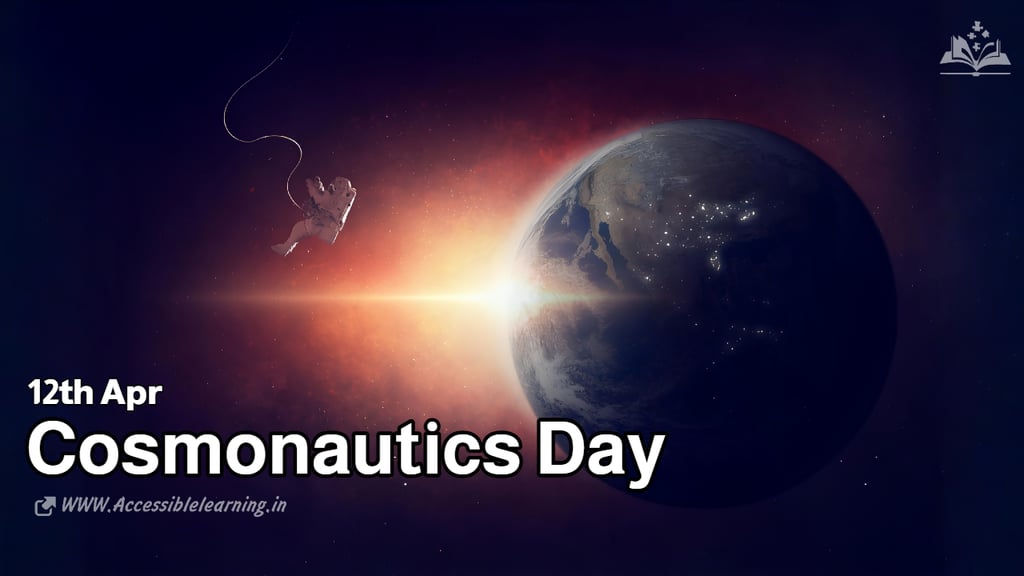
Cosmonautics Day: Celebrating Humanity's Leap into Space
Cosmonautics Day, celebrated on April 12th, honors Yuri Gagarin’s historic spaceflight and humanity’s achievements in space exploration. Learn about its significance, global celebrations, and the future of space travel in this in-depth article.
EVENT/SPECIALSPACE MISSIONCELEBRATION/FESTIVALSEDUCATION/KNOWLEDGERUSSIA
Kim Shin
4/5/20253 min read


Every year on April 12th, the world celebrates Cosmonautics Day, a tribute to the incredible achievement of Yuri Gagarin, the first human to journey into outer space. This momentous occasion is not just about one man’s triumph but a celebration of human curiosity, courage, and technological advancements in space exploration.
Recognized primarily in Russia and former Soviet states, Cosmonautics Day has also gained global recognition, being officially declared as the International Day of Human Space Flight by the United Nations in 2011. This day reminds us how far we've come and how much further we can go in unraveling the mysteries of the universe.
The Historic Flight of Yuri Gagarin
On April 12, 1961, Soviet cosmonaut Yuri Gagarin made history aboard the spacecraft Vostok 1. His mission lasted 108 minutes, during which he orbited the Earth once at an altitude of approximately 327 kilometers (203 miles). Gagarin's legendary words, "Poyekhali!" ("Off we go!"), marked the beginning of humanity’s venture beyond our planet.
Despite the dangers and uncertainties of space travel at the time, Gagarin’s flight was a flawless success. His safe return made him an international hero and solidified the Soviet Union’s lead in the Space Race. This accomplishment paved the way for future missions, eventually leading to the moon landing and beyond.
The Significance of Cosmonautics Day
Cosmonautics Day is more than just a remembrance of the past; it is a celebration of space science and technology. It serves as an inspiration for new generations of scientists, engineers, and astronauts who continue to push the boundaries of space exploration. The day highlights:
The bravery and determination of cosmonauts and astronauts worldwide.
The advancement of space technology, from satellites to space stations.
The importance of international collaboration in space research.
The potential for future space exploration, including Mars missions and deep-space travel.
The impact of space technology on everyday life, including telecommunications, GPS, and medical advancements.
The role of women in space exploration, celebrating pioneers like Valentina Tereshkova, the first woman in space, and modern astronauts shaping the future.
How Cosmonautics Day is Celebrated
In Russia and Former Soviet States
In Russia, Cosmonautics Day is a national holiday filled with events, exhibitions, and ceremonies. Celebrations often include:
Wreath-laying ceremonies at the monuments of Yuri Gagarin.
Space-themed exhibitions and educational events for students and space enthusiasts.
Public speeches and parades honoring the contributions of space pioneers.
Broadcasts of historical footage from Gagarin’s flight and other space missions.
Competitions and space quizzes are held in schools to engage young minds in space science.
Around the World
Beyond Russia, space agencies and institutions globally celebrate the day by
Hosting public lectures and webinars about space exploration.
Encouraging students to pursue careers in STEM (Science, Technology, Engineering, and Mathematics).
Promoting international cooperation through space research projects.
Organizing astronomy nights where people can observe the sky and learn more about the universe.
Virtual reality space tours, allowing individuals to experience spaceflight simulations.
Space-themed movie screenings featuring films like "Apollo 13" and "Interstellar."


The Future of Human Spaceflight
Since Gagarin’s flight, space exploration has progressed dramatically. Today, astronauts from multiple nations live and work on the International Space Station (ISS), and private companies like SpaceX, Blue Origin, and Roscosmos are pushing the limits of space travel. Upcoming missions aim to:
Return humans to the Moon through NASA’s Artemis program.
Send the first astronauts to Mars in the coming decades.
Develop space tourism for civilians.
Explore deep space using advanced telescopes and robotic probes.
Harness resources from asteroids, potentially revolutionizing space economics.
Create sustainable habitats on the Moon and Mars, supporting long-term human presence in space.
Develop AI-powered space technology to assist astronauts and advance planetary exploration.
Interesting Facts About Cosmonautics and Space Exploration
The first artificial satellite, Sputnik 1, was launched by the Soviet Union in 1957, marking the beginning of the Space Age.
Valentina Tereshkova became the first woman in space on June 16, 1963, aboard Vostok 6.
Alexei Leonov performed the first-ever spacewalk in 1965, lasting 12 minutes outside his spacecraft.
The ISS orbits Earth at a speed of approximately 28,000 km/h (17,500 mph), completing an orbit every 90 minutes.
NASA and Roscosmos continue to work on joint missions, despite political tensions on Earth, showing the unity of science beyond borders.
Scientists are developing space elevators, a theoretical concept that could revolutionize space travel by reducing costs and making space more accessible.
Cosmonautics Day is a powerful reminder of what humanity can achieve through innovation, courage, and unity. Yuri Gagarin’s historic flight was just the beginning, and with modern advancements, space exploration is entering an exciting new era. As we celebrate this day, we honor the pioneers who made space travel possible and look forward to the incredible discoveries that await us among the stars.
Whether you're a space enthusiast, a student dreaming of becoming an astronaut, or simply someone who marvels at the night sky, Cosmonautics Day is a time to reflect on how far we've come and the infinite possibilities ahead.
Happy Cosmonautics Day!
Subscribe To Our Newsletter
All © Copyright reserved by Accessible-Learning Hub
| Terms & Conditions
Knowledge is power. Learn with Us. 📚


